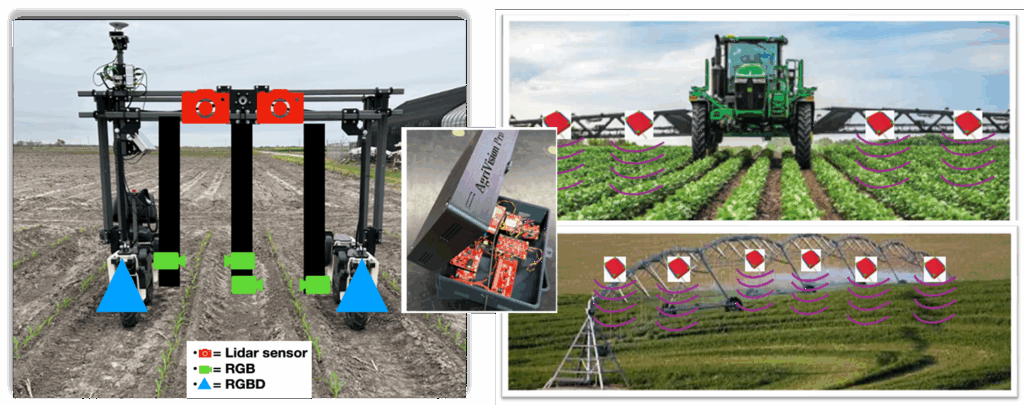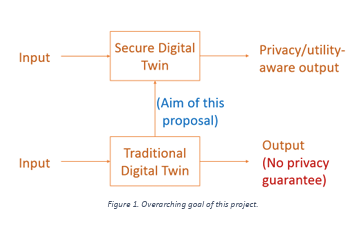The Texas A&M Institute of Data Science (TAMIDS) is at the forefront of fostering groundbreaking research through its Early Career Collaboration Grant program. One year after receiving this grant, several promising projects from our 2024 cycle have achieved significant milestones, demonstrating how strategic investment in early-career faculty is yielding innovative solutions across critical sectors, including agriculture, energy, public health, and disaster preparedness. These initiatives underscore the power of data science to address complex societal challenges and position Texas A&M as a leader in interdisciplinary research. Below are some of the key advancements from the past year.

AI-powered Robotics for Real-Time Crop Insights
A data collection and processing unit designed for early-season plant counting in digital agriculture has been developed with the goal of seamless integration with various farm equipment.
Developing a multi-source data integration, processing, and analytics system for a Robotic Platform (Mahendra Bhandari – College of Agriculture & Haoyu Niu – Texas A&M Institute of Data Science)
Energy Optimization on Campus using Digital Twins
This project has successfully proved the viability of using Urban Building Energy Models (UBEMs) for energy optimization planning and operations on campus through “what-if” scenarios
Urban Digital Twin Integration for Energy Optimization in Indoor-Outdoor Campus Environments (Ashrant Aryal, Xinyue Ye – School of Architecture)


Identifying and Understanding HPV-related Misinformation on YouTube
An extensive dataset of engagement patterns involving misinformation about Human Papillomavirus (HPV) and cervical cancer screening on YouTube has been created. This research team has published a paper on language models for deception detection titled “Hidden in Plain Sight: Evaluation of the Deception Detection Capabilities of LLMs in Multimodal Settings.”
Contextualizing Cervical Cancer Screening & Human Papillomavirus (HPV) Vaccine Information and Corresponding Risk Perceptions (Shawn Chiang – School of Public Health & Ruihong Huang – College of Engineering)
Optimizing Hurricane Evacuation Planning with Simulation Models
The framework developed by this research team integrates optimization and simulation models, considering the probabilistic nature of hurricane occurrences and realistic human behaviors to facilitate effective public communication and distribute traffic.
Human-Centered Data-Driven Decision Making for Integrated (Re)Zoning and Evacuation Planning (Xiaofeng Nie, David Eckman – College of Engineering)


Privacy-Aware Digital Twin Models
A novel theoretical and methodological framework has been developed for Gaussian process regression that incorporates privacy constraints. This work quantifies the tradeoffs between utility and privacy in digital twins to safeguard sensitive data.
Quantifying Utility vs. Privacy Tradeoffs in Digital Twins (Rui Tuo & Raktim Bhattacharya – College of Engineering)
AI-driven Modeling in Desalination Plant Processes
This team has developed a physics-based digital twin model to simulate the desalination process, integrating fluid dynamics and membrane transport principles. It has the capabilities to visualize critical parameters and provide insights for optimization.
Modeling and Control of Grid-interactive Desalination Plants (Guanyu Tian – Texas A&M-Galveston, Zheng O’Neill – College of Engineering)


Early Detection of Bovine Respiratory Disease in Beef Cattle using Computer Vision
A sensor array was installed at the Texas A&M Beef Cattle Center to monitor feeding and movement behavior with thermal cameras for non-invasive temperature readings. Extensive data, images, and videos were gathered to begin building computer models that can recognize individual animals and detect patterns linked to early signs of illness.
Developing a Computer Vision Data Pipeline for Bovine Respiratory Disease Prediction in Beef Cattle (Karun Kaniyamattam – College of Agriculture & Life Sciences, Yalong Pi – Texas A&M Institute of Data Science)
Looking Ahead
Many of these projects are planning further collaborations with TAMIDS, including student competitions, workshops, and joint grant submissions. The TAMIDS Early Career Collaboration Grant is not just funding research; it’s creating a dynamic network of innovation and talent at Texas A&M, ready to lead the way to impactful discoveries.



